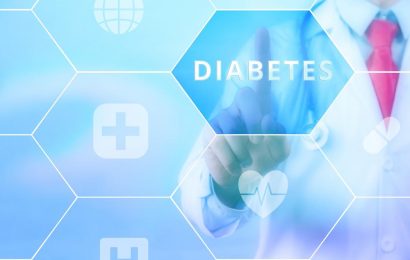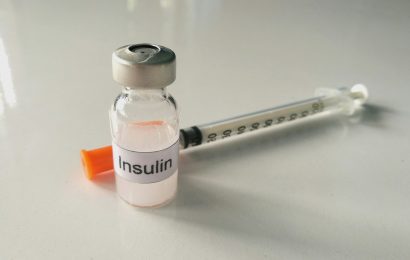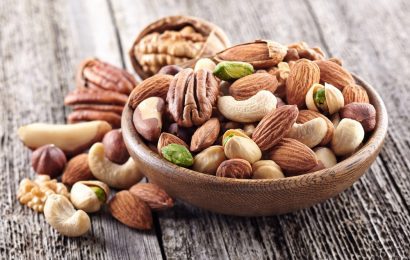An exciting Israeli study finds that when you eat and how often you eat is more important than what you eat when it comes to glucose control and weight.
Twenty-nine insulin-using patients with Type 2 diabetes and obesity were broken into two groups. Both groups ate 1600 calories a day. One group ate a large breakfast, a medium-sized lunch, and a small dinner. The second group ate a more common diabetes weight-loss diet: six small meals or snacks evenly spaced throughout the day.
Glucose levels were monitored for the first two weeks and again at the end of the study using a continuous glucose monitor (CGM). The big-breakfast group decreased their fasting glucose from 161 mg/dl (8.9 mmol/l) to 107 mg/dl (5.9 mmol/l). The control group levels dropped much less: from 164 mg/dl (9.1 mmol/l) to 141 mg/dl (7.8 mmol/l).
People eating large breakfasts needed significantly less insulin. Their food cravings and hunger were reduced. The control group needed more insulin and their hunger and cravings increased.
The breakfast group lost an average of 11 pounds, while those in the control group gained an average of 3 pounds.
Unfortunately, the study was not a crossover design — the researchers didn’t switch the groups and try again, so there could have been between-group differences that caused the results. But other studies have found similar advantages to breakfast.
Lead study author Daniela Jakubowicz, MD, said, “The hour of the day when you eat and how frequently you eat is more important than what you eat and how many calories you eat. Our body metabolism changes throughout the day. A slice of bread consumed at breakfast leads to a lower glucose response than an identical slice of bread consumed in the evening.”
You may have heard the saying, “Eat breakfast like a king, lunch like a prince, dinner like a pauper.” It’s true. A study published in the Journal of Nutrition followed 50,000 people in California. Those who ate their biggest meal at breakfast had a lower body-mass index (a measure of weight relative to height) than those who ate most at supper, even though their calorie intakes were the same.
Study lead author Dr. Hana Kahleova said a large breakfast “seems to [reduce hunger], reduce total energy intake, improve overall dietary quality, reduce blood lipid, and improve insulin sensitivity and glucose tolerance. Eating large meals in the evening generally has the opposite effects,” she said.
What’s a good breakfast?
How to get the benefits of a large breakfast? You want food that will keep your sugar stable, like protein and fiber.
Dietitian Kerri Lynn Jennings MS, RD, says to focus on protein. She suggests egg whites — I’d say eat the whole egg — lean meat such as Canadian bacon, Greek yogurt, milk, nuts, beans, and cheeses. Other authorities mention nut butters and avocados as good breakfast foods.
Fiber also tends to keep glucose and energy levels stable. Jennings and others recommend whole-grain cereals like oatmeal. She says vegetables also contain lots of fiber and some useful protein. You don’t have to eat animal products to get protein. Nuts and beans are great ways to start the day. Nuts are faster, but beans might be tastier if you have a good recipe.
Avoid fruit juice and sweetened fruits, not just at breakfast but all day. Another thing to avoid is eating breakfast out: Restaurant or bagel shop breakfasts tend to run very high in carbohydrates and calories.
Finding time to like breakfast
Most Americans eat small breakfasts, if we eat them at all. We’re too busy, or we don’t like breakfast foods much. If your fasting glucose is high, you might delay or skip breakfast to bring it down.
Skipping is not a good idea. Going hungry might stimulate your liver to pump out more glucose, which is called the dawn phenomenon. Hunger will also provoke you to eat an unhealthy mid-morning snack.
A good strategy is to get up earlier, creating time and space to eat. This, in turn, might mean going to sleep a little earlier.
Pick out a breakfast menu with foods you like and that are easy to prepare. Perhaps you can prepare them in advance. If you inject insulin before meals, preparing in advance makes it easier to know how many grams of carbs you need to cover for.
If you like leftovers, you’re in luck. Maybe you can split dinner into two halves and microwave half for breakfast. Hot food is often easier to enjoy and digest.
Smoothies can also be good sources of protein, energy, and fiber. You can make those in advance and refrigerate them, although freshly made smoothies might be more appealing to you.
Your family’s cooperation will make breakfast-eating easier. For children, studies have linked breakfast consumption with better school performance. So get them to eat with you!
Want to learn more about diabetes and the importance of breakfast? Read “Dealing With After-Meal Blood Sugar Spikes? Don’t Skip Breakfast” and “The Benefits of Breakfast,” then try some of our delicious, diabetes-friendly breakfast recipes.





